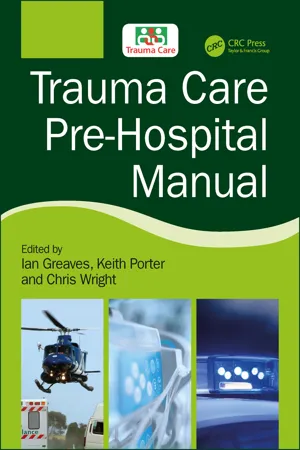
eBook - ePub
Trauma Care Pre-Hospital Manual
Ian Greaves, Keith Porter, Ian Greaves, Keith Porter, Chris Wright
This is a test
- 412 pagine
- English
- ePUB (disponibile sull'app)
- Disponibile su iOS e Android
eBook - ePub
Trauma Care Pre-Hospital Manual
Ian Greaves, Keith Porter, Ian Greaves, Keith Porter, Chris Wright
Dettagli del libro
Anteprima del libro
Indice dei contenuti
Citazioni
Informazioni sul libro
This new book provides evidence based guidelines for the immediate clinical management of major trauma.It has been written by clinicians with many years of trauma experience, and endorsed as authoritative by Trauma Care (UK).
The UK now has highly effective trauma systems. Clinical developments include the introduction of damage control resuscitation, tranexamic acid, blood product resuscitation, novel hybrid resuscitation and an emphasis on the control of major external haemorrhage as part of a new ABCDE approach. Consequently, more individuals with major trauma are surviving than ever before. Optimal pre-hospital care is essential for improved survival rates and reduced morbidity.
Domande frequenti
Come faccio ad annullare l'abbonamento?
È semplicissimo: basta accedere alla sezione Account nelle Impostazioni e cliccare su "Annulla abbonamento". Dopo la cancellazione, l'abbonamento rimarrà attivo per il periodo rimanente già pagato. Per maggiori informazioni, clicca qui
È possibile scaricare libri? Se sì, come?
Al momento è possibile scaricare tramite l'app tutti i nostri libri ePub mobile-friendly. Anche la maggior parte dei nostri PDF è scaricabile e stiamo lavorando per rendere disponibile quanto prima il download di tutti gli altri file. Per maggiori informazioni, clicca qui
Che differenza c'è tra i piani?
Entrambi i piani ti danno accesso illimitato alla libreria e a tutte le funzionalità di Perlego. Le uniche differenze sono il prezzo e il periodo di abbonamento: con il piano annuale risparmierai circa il 30% rispetto a 12 rate con quello mensile.
Cos'è Perlego?
Perlego è un servizio di abbonamento a testi accademici, che ti permette di accedere a un'intera libreria online a un prezzo inferiore rispetto a quello che pagheresti per acquistare un singolo libro al mese. Con oltre 1 milione di testi suddivisi in più di 1.000 categorie, troverai sicuramente ciò che fa per te! Per maggiori informazioni, clicca qui.
Perlego supporta la sintesi vocale?
Cerca l'icona Sintesi vocale nel prossimo libro che leggerai per verificare se è possibile riprodurre l'audio. Questo strumento permette di leggere il testo a voce alta, evidenziandolo man mano che la lettura procede. Puoi aumentare o diminuire la velocità della sintesi vocale, oppure sospendere la riproduzione. Per maggiori informazioni, clicca qui.
Trauma Care Pre-Hospital Manual è disponibile online in formato PDF/ePub?
Sì, puoi accedere a Trauma Care Pre-Hospital Manual di Ian Greaves, Keith Porter, Ian Greaves, Keith Porter, Chris Wright in formato PDF e/o ePub, così come ad altri libri molto apprezzati nelle sezioni relative a Medicine e Surgery & Surgical Medicine. Scopri oltre 1 milione di libri disponibili nel nostro catalogo.
Informazioni

Objectives
After completing this chapter the reader will
- Comprehend the scale of the challenge presented by trauma across the world
- Understand the different effects of trauma in developed and less developed societies
- Understand the importance of prevention in reducing the impact of trauma internationally
Introduction
All we can do in the face of that ineluctable defeat called life is to try to understand it.
Milan Kundera, The Curtain (1)
The aetiology, pathophysiology and management of trauma are complex and challenging. In contrast to a disease process, trauma as an aetiological factor involves more or less immediate external energy transfer into the human body, whether caused by mechanical, thermal or some other form of energy. In order to better understand the multitude of factors involved in the process of traumatic injury, a wider perspective encompassing the context in which the trauma occurs is warranted. When analysing the evolving trends in trauma, a perspective is needed that goes beyond narrow local and clinically orientated views. This chapter considers trauma in its widest context, including other causes of mortality and morbidity, with an emphasis on the causes and manifestations of trauma on a global scale.
The Big Picture
Many seemingly unrelated events in different parts of the world produce the same end result: one or more people are severely injured or killed as a result of trauma, whether associated with a natural or man-made disaster, a single violent act by an individual, organised crime, an industrial accident, terrorism or warfare. Although easily interpreted as individual and unrelated events, there are many trends in the globalised world that offer at least a partial explanation of the root causes of these occurrences.
Various combinations of fundamentalism, individual and institutional greed, inequality and lack of basic human rights and democracy, just to mention the most obvious factors, can lead to unforeseen consequences. For example, the Arab Spring, which began on December 18, 2010, in Tunisia as a protest against police corruption and ill treatment, triggered demonstrations, protests, riots, civil wars and revolutions all over North Africa and the Middle East culminating in the Syrian civil war that started in 2011. As a consequence of the Syrian civil war, hundreds of thousands of Syrians have sought to escape their war-torn country creating the worst refugee problem in Europe since the Second World War. After 4½ years of war, more than a quarter of a million people have died, many whilst trying to cross the Mediterranean or in the hands of human traffickers. Eleven million have fled their homes (2). In addition to these refugees from war, many others seek better living conditions by trying to enter the United States or the European Union illegally, adding to the already explosive refugee problem.
The financial crisis of September 2008 originating in the United States but having economic consequences throughout the world can be seen just as a temporary setback in continuous globalisation and the success story of the current consumer- and market-orientated way of life. However, it could also be a signal that the current culture based on speculation and immediate reward is no longer sustainable. Immanuel Wallerstein (3) has predicted that after half a millennium of success, the recognisable capitalist world order is coming to an end and is likely to bring chaos for the next 50 years. The main reason he gives is a decrease in profits due to a shortage of cheap labour and natural resources. According to some economists, there are also fundamental flaws in the global monetary and banking system, where independent countries have to increasingly rely on financing their budgets with borrowed money (4). It is also clear that the reactions of individual organisations and states are closely entwined. The current and ongoing political and economic crisis in Greece, for example, was triggered by the fear of losses to major German and French banks. The Greek financial crisis demonstrated that the real global financial (and by extension political) power rests not only in major economies such as the United States, China or Germany, but in the multinational institutions and corporations that also have substantial political influence. Inevitably, unrest and a sense of injustice will lead to changes in the global pattern of trauma.
As stated in a TV interview by Kishore Mahbubai, a leader of the Lee Kuan Yew School of Public Policy in Singapore, 900 million Westerners, 15% of the world population, can no longer dictate world opinion. With the increasing economic power of Asia, especially China and India, it can be expected that their role in the global economy as well as in international organisations will grow at the expense of a Europe that is suffering from shrinkage of its population. According to an estimate by the Berlin Institute, the population of Europe will...